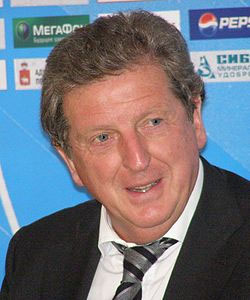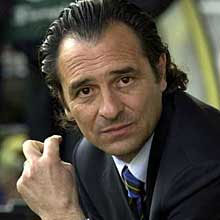DONETSK, (Reuters) – When England face Italy in the Euro 2012 quarter-finals on Sunday they will be led by two coaches who typify the calm, modest and diplomatic style which is increasingly favoured by Europe’s top international managers.

The old-school disciplinarian, an authoritarian figure who demands respect and barks orders, has not quite disappeared, although, perhaps by coincidence, the representatives of that approach have already headed home.
Ukraine’s Oleg Blokhin, who ended the tournament by inviting a critical journalist outside for a ‘man’s conversation’, Denmark’s Morten Olsen, who angrily lambasted a local official who forgot the name of one of his players and the always colourful Giovanni Trapattoni are all out of the tournament.
On Sunday, England’s Roy Hodgson, whose quiet and modest approach has won over many of those who were skeptical of his credentials for such a high-pressure job, comes up against Cesare Prandelli, the methodical Italian coach.
Until recently England were led by Italian Fabio Capello, who struggled to build a genuine rapport with his players while Prandelli’s predecessor was the equally no-nonsense Marcello Lippi.
It is hard to imagine Lippi tolerating Mario Balotelli’s eccentricities, let alone putting in the time Prandelli has to cajole, encourage and reassure the moody forward.
Likewise Capello would not have given the skillfully diplomatic performances with the international press that Hodgson has, warmly praising the tournament hosts, personally greeting old friends in the media from various countries by name and gently avoiding controversy.
Prandelli and Hodgson are talkers rather than shouters, not only in the always rather fake environment of press conferences but on the training field and during games where a ‘quiet word’ rather than a scream from the touchline is their modus operandi.

Hodgson has gained his approach from years spent in Sweden, Switzerland, Finland and Italy as well as England’s Premier League, learning along the way how to win friends from varied backgrounds as well as get results.
With his players, Hodgson has tried to take away the fear and excessive pressure, which has broken previous England teams, emphasising instead what a wonderful opportunity a tournament can be.
“It’s been a really good tournament for us,” he said after beating Ukraine to top their group.
“We want to just keep going and try to enjoy this tournament for as long as we can and who knows where it will take us?”
BRIEF SPELL
Prandelli’s experience has been entirely in Italy but significantly, as a coach, apart from a very brief spell with AS Roma, cut short when he quit after his late wife was diagnosed with cancer, he has been away from the big clubs.
Being coach of Juventus, AC Milan and Inter, where the pressures from fans and media are most intense, can harden a man, but Prandelli established himself as a top manager with Parma and Fiorentina, where more emphasis is placed on developing a warm connection with fans than on winning titles.
Prandelli has also won the respect of many for taking a stand on racism and homophobia in Italian football and making a conscious decision to integrate foreign-born players into the team against the wishes of traditionalists.
France’s Laurent Blanc is another coach who seems to have realised that there is plenty to be gained by listening to players and trying to work on their fears and weaknesses.
He has succeeded where his predecessor Raymond Domenech failed by getting the best out of a bunch of talented but sometimes impudent players but he is no pushover, combining a discreet approach with firm leadership.
“With these lads you need to be strict and demanding. When they throw away a goal chance you just don’t tell them they did well because they try. You tell them they must score,” he said.
Yet, the former France captain known as “the president” as a player, clearly makes his demands in a way which has avoided the kind of public conflicts that have plagued previous French teams.
Germany’s Joachim Loew is perhaps the most charismatic of the coaches left in the tournament, as well as competing with Blanc for the best dressed, but even his livewire approach is blended with the democratic spirit that emerged during Juergen Klinsmann’s time in charge of the team.
It remains to be seen if this becomes an established approach but the signs are that the high-paid, high-pressured, modern player responds best to a coach who treats him as an adult, a colleague in the business of trying to get results for that most demanding of customer – a nation’s football fans.








